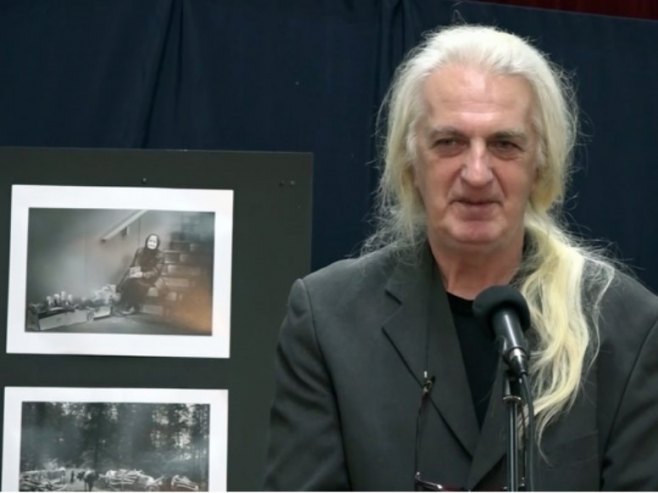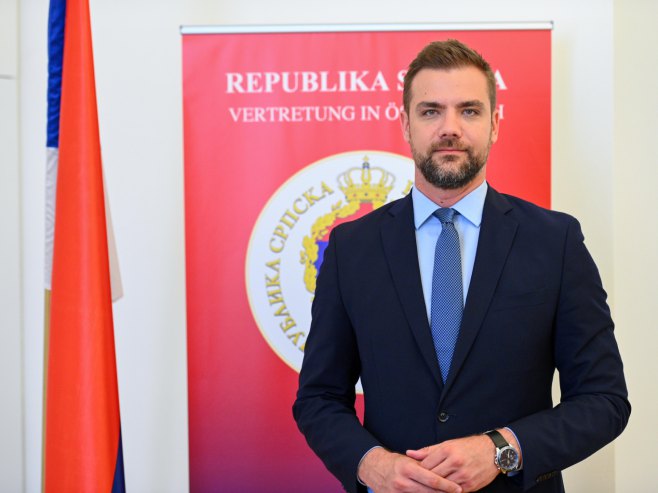Two individuals, like lost boys, spoke at the UN Security Council session on the situation in Bosnia and Herzegovina (BiH), revealing their personal views and clearly demonstrating to the world the extent of their unfounded ambition and pitiful understanding of the constitutional arrangement of BiH, stated Professor of Constitutional Law Siniša Karan.
In an op-ed for Srna, Professor Karan emphasized that the private addresses of the two individuals, unburdened by knowledge, facts, arguments, or the truth about the real situation in BiH, and intoxicated by an incredible desire for the unitarization of BiH, can be easily stripped bare with just a few truths.
The Truth About Sovereignty
The Declaration on the Proclamation of the Republic of the Serb People in BiH on January 9, 1992, marked the creation of the Serb state in the territory of the then Socialist Republic of BiH. This was later renamed the Republic of Srpska BiH and then the Republika Srpska, as a response to the illegal and illegitimate aspirations of Muslims (who did not yet call themselves Bosniaks) and Croats to secede the entire territory of BiH from SFR Yugoslavia.
This declaration clearly defined that the Serb people in BiH wished to remain part of SFR Yugoslavia as its federal unit, confirmed in the plebiscite held on November 9 and 10, 1991.
The Republika Srpska was established based on the will of the Serb people expressed in this plebiscite and defined its status within the federal state of Yugoslavia as its federal unit. This constitutional and legal capacity was brought into the Dayton, newly created federal BiH as a federal unit, which it still retains today.
The Republika Srpska particularly defined the issue of territorial demarcation with the political communities of other peoples in BiH, as well as resolving other mutual rights and obligations, in a manner that this issue would be executed peacefully and through agreement, respecting ethnic, historical, legal, cultural, economic, geographical, communicational, and other essential criteria, and in compliance with the principles and rules of international law.
Therefore, it is crucial to not ignore the very important fact that at the time of the creation of Dayton BiH in 1995, two states existed on the territory of the former SR BiH – the Republika Srpska since 1991 and the so-called Republic of BiH, later the Federation of BiH since 1994, which merged (aggregation) into a new confederal, complex, and multi-ethnic state community, almost a union, BiH. This means that Dayton BiH is a state community composed of Srpska and the Federation of BiH.
Those who try to turn Srpska into an administrative unit, as opposed to the federal unit which is essentially a state itself and entered BiH as such, must bear in mind that in doing so, they only further jeopardize the very existence of BiH, and Srpska is brought back to the foundations of 1995, when it entered the state community of BiH with its full state capacity.
The Truth About Continuity
The key difference in the perception of the entirety of the Dayton Agreement and today’s BiH, between the Republika Srpska and the Federation of BiH, is most visible on November 25 – the Day of ZAVNOBiH which is celebrated in the Federation of BiH as the so-called “Statehood Day”, while in Srpska, November 21 is celebrated – the day the Dayton Agreement was reached, marking the end of the war.
The difference lies in the fact that somewhere it is believed that there is continuity of the Socialist Republic of BiH, while in the Republika Srpska, it is considered that with the dissolution of the former Yugoslavia, the SR BiH ceased to exist, and BiH emerged as a new state that gained its statehood for the first time on November 21, 1995.
The full statehood of BiH was given precisely by the Republika Srpska by granting it part of its internal sovereignty in favor of external sovereignty. Today’s BiH has exclusively international external sovereignty as a complex federal community, while Srpska and the Federation of BiH, as federal units, received international recognition carrying full internal subjectivity and sovereignty.
ZAVNOBiH cannot be the continuity of BiH because the SR BiH disintegrated, precisely by the will of the Muslims who wanted its exit from SFR Yugoslavia. Based on this and the right to self-determination, the Republic of Srpska was formed.
The foundation of the constitutional state arrangement of the newly formed federal state community are the Geneva and New York principles, which are directly incorporated and elaborated in the Constitution of BiH, and not the AVNOJ or ZAVNOBiH principles, as with the dissolution of SFRY and SR BiH, those principles lost their essence.
BiH has never been a state until Dayton. It always had a different status – territorial, administrative, or as a federal unit in SFRY.
The conclusion of the Badinter Commission on the dissolution of SFRY was the basis for the creation of new states from the former federal units with the note that the right to self-determination was foreseen for the peoples in SFRY, not for the federal units or then-republics. Thus, the former SR BiH disintegrated and based on the same principle of dissolution and the principle of self-determination of the peoples, the Republic of Srpska was established.
Therefore, the Republika Srpska was in fact a state with full capacity in the period 1992–1995 and with such full state capacity, it entered the Dayton negotiations.
The Constitution of the Serb Republic of BiH in 1992 immediately defined its directions of development, based on the inalienable and non-transferable natural right of the Serb people to self-determination, self-organization, and association based on which it freely determines its political status. In this sense, the Constitution determines the Republic within the federal state of Yugoslavia but also provides the possibility of entering into unions with state creations of other constituent peoples in BiH.
In 1995, two states (the Republika Srpska and the Federation of BiH) unite, thus ceding part of their sovereignty, that is, ten precisely specified competencies (external sovereignty) in the Constitution of BiH with a new federal internal structure.
Thus, the Dayton Agreement has no connection with the continuity of SR BiH, because without the sovereignty of the Republika Srpska and the Federation of BiH, which they transferred in 1995, today’s BiH would not exist.
The thesis about the continuity of BiH is incorrectly interpreted, as even Article 1 of the Constitution of BiH clearly states, “The Republic of Bosnia and Herzegovina, whose official name shall henceforth be ‘Bosnia and Herzegovina'”, confirming that it did not exist since 1992.
This means that the current BiH only on November 21, 1995, gains a new name, a new internal federal structure. This agreement recognizes and confirms that the Republika Srpska entered the creation of the newly formed federal BiH with full state capacity, bringing along its Constitution.
The Truth About the Constitutional Court of BiH
The principles based on which the three warring sides agreed to live together were the only possible guarantees that each nation could continue its existence in freedom, equality, and the emancipation of their cultural, ethical, linguistic, spiritual, religious, and historical values…
The guarantee for their participation in state power is the parity composition with other peoples and consensus as a way of making decisions, which is also a principle preventing any outvoting and majorization.
All legislative and executive institutions at the level of the joint institutions of the federal state community had these mechanisms as constitutional guarantees according to these principles, but only one institution – the Constitutional Court of BiH, “due to naive construction” about the authority of independent legal thought and the ideal law and fairness, did not foresee the protection of parity and consensus neither of the federal units (entities) nor the constituent peoples.
“Such requirements and conditions, interpreted in this way, would not be in accordance with the principle of judicial independence,” so the negotiators in Geneva, New York, and Dayton thought. And they were gravely mistaken.
This mistake has become the “strength” of the anti-Dayton Constitutional Court of BiH, which for almost 30 years, Muslim political representatives, high representatives, and foreign centers of power have been using to destroy, change, reshape, and modify the complex, agreed federal framework of the state arrangement, turning it into a unitary, centralized state community at the will of the majority Bosniak people, where entities (federal units) become highly decentralized administrative-territorial administrative areas with the power of local self-government units.
If there is a mistake that deviates from the entirety of the being, but also the principles of the Dayton Agreement, then it is the Constitutional Court of BiH.
Today, the Constitutional Court of BiH is an alienated center of (all)power, the authority over authorities, an example of judicialocracy on the scene, an organ of arbitrariness, an outpost of the great-Bosniak majoritarian policy, the destroyer of the Dayton agreed principles and the Constitution of BiH, and the leader in eliminating the found framework for a common life in a multiethnic confederal-federal newly formed state community.
For the Constitutional Court of BiH, it must be clearly said that it is not recognized in the Constitution as a legislator, and it should be challenged as an unconstitutional legislator.
In normal countries, the Constitutional Court isresponsible for protecting constitutionality and legality, but in BiH, it has been operating according to unconstitutional acts for 30 years, especially now according to unconstitutional acts of someone who is neither recognized in the Constitution nor in the Dayton Agreement, thereby making a historical mistake in undermining the constitutional system of BiH.
The Truth About the High Representative
The Dayton Agreement and Annex 10 are the only measure of who has the status of High Representative. It is the person for whom the consent of the Republika Srpska and the Federation of BiH and relevant confirmation by a resolution of the UN Security Council is required. Everything else is speculation and abuse.
Thus, BiH today does not have a High Representative, despite administrative and linguistic games aimed at creating the illusion that the German citizen Christian Schmidt is the High Representative.
Regarding the High Representative, with Schmidt’s arrival and his false presentation as the High Representative, not only has there been an overstepping and usurpation of Annex 10 of the Dayton Agreement, but the false High Representative’s overstepping has led to the practical conclusion that BiH does not even have a Constitution today.
Interventions by High Representatives have created a Constitution that no longer relates to its constitutional reality. Let me remind you that until 2009, High Representatives enacted 105 amendments to the constitutions of entities, issued more than 800 decisions, enacted more than 300 regulations, and carried out around 500 dismissals (extrajudicial punishments without any process or possibility of appeal), without any basis in the Dayton Agreement or international law.
Simply, the institution of the High Representative and the influence of the international community must disappear from BiH so that the two entities and the three constituent peoples can be sovereign.
The Truth About Serbia as a Guarantor of Dayton
The General Framework Agreement for Peace in BiH, or the Dayton Agreement, is an international peace agreement, and only the contracting parties can change or put it out of force.
This agreement falls under the jurisdiction of international public law, specifically the Vienna Convention, which deals with international treaties.
The Dayton Agreement represents the fifth and final attempt (after the Cutileiro Plan, the Vance-Owen Plan, the Stoltenberg Plan, and the Contact Group Plan) by the international community to find an acceptable overall solution for everyone in BiH, especially territorially.
It is, therefore, a compromise act that stopped the war and established a new confederal-federal, complex state community of BiH, recognizing the Republika Srpska and the Federation of BiH as state-creating entities with full internal sovereignty and limited external sovereignty.
The Dayton Peace Agreement, especially its integral part – the Constitution of BiH, is seen today, almost 30 years later, as the only possible normative framework for a joint life in BiH. At that time, it represented the reflection of the real social relations and circumstances of 1995, which have not changed even after 29 years.
The Dayton Peace Agreement can be viewed from multiple aspects, primarily legal. It is crucial that in all 11 annexes, the participants as parties are the Republika Srpska and the Federation of BiH. The public often refers to Annex Four when speaking about the Dayton Peace Agreement, which is a much broader entity. Annex Four, or the Constitution of BiH, is the only segment of the agreement that is amendable.
The truth that the two boys should know is that Serbia, as well as Croatia, are guarantors of the Dayton Agreement.
Serbia, as a guarantor of the Dayton Agreement, has shown its commitment to maintaining peace and promoting reconciliation in BiH, fully respecting the letter of that agreement.
And finally, to reiterate for the speculators:
The Republika Srpska was created in peace, through the free and democratic will of the Serb people, as a response to the violation of the Constitution of the SR BiH and the Constitution of the SFRY by the Muslim-Croat coalition. The Republika Srpska was defended in the civil war because the Serb people were forced to do so by the will of others who desired war, openly admitting they would sacrifice peace.
BiH as a state community of two equal entities, which brought their statehood into Dayton BiH, and three constituent peoples has existed since 1995 and the signing of the Dayton Peace Agreement, confirming that the Republic of Srpska is older than BiH as a state.
Source: RTRS






)


